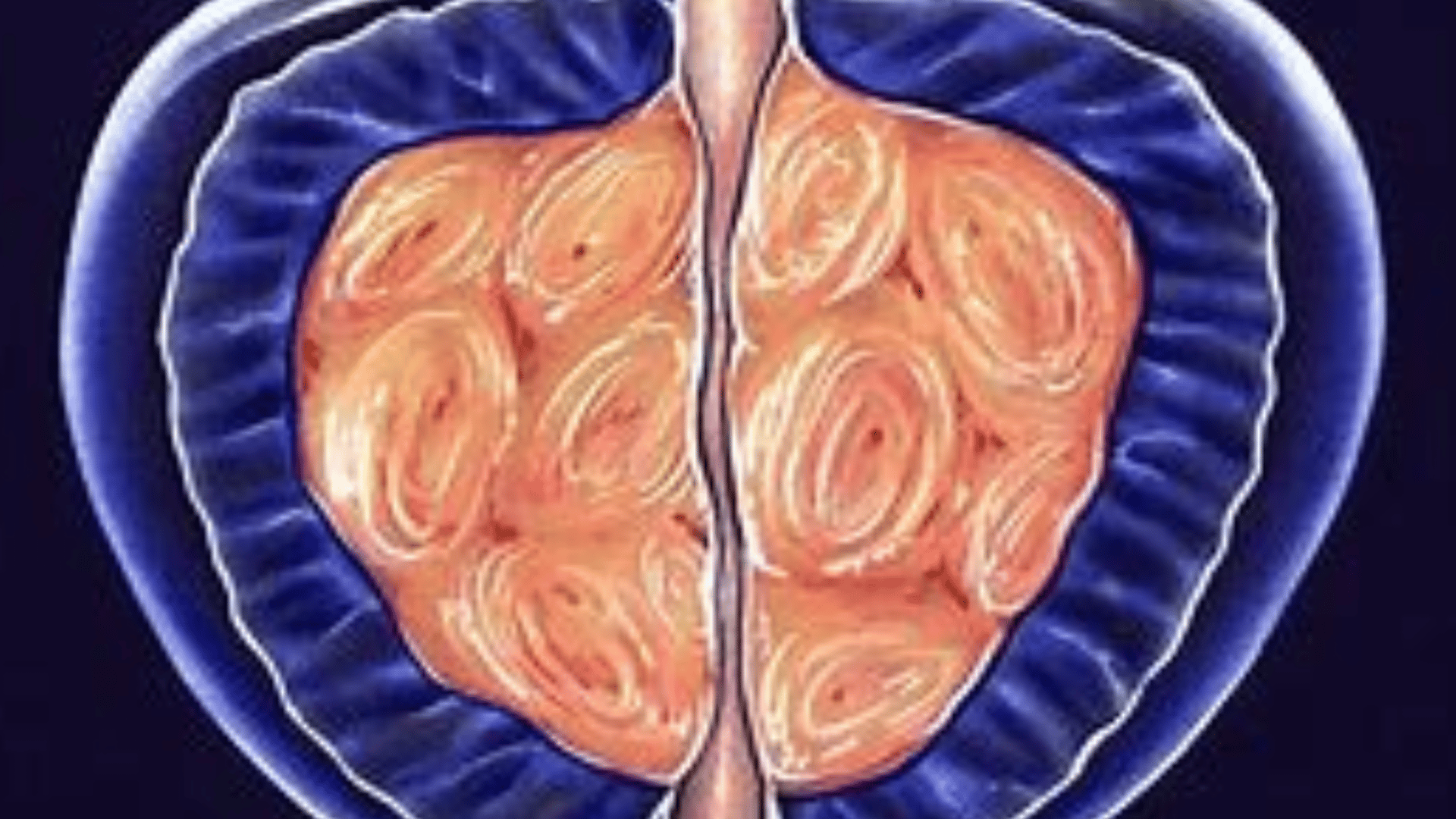
Shrinking Enlarged Prostate - BPH and Cancer Treatment
Explore effective treatment options for managing an enlarged prostate caused by benign prostatic hyperplasia (BPH) and cancer. Discover how fasting may help alleviate BPH symptoms and improve your quality of life.
GENERAL
Dr Hassan Al Warraqi
6/9/2024
Shrinking Enlarged Prostate - BPH and Cancer Treatment
It is a procedure used to treat prostate enlargement, a common condition that affects men after the age of forty.
This procedure is performed by reducing the size of the enlarged prostate to improve urine flow and relieve the symptoms of cystitis and the constant need to urinate.
A range of methods are used to shrink the prostate, including drug therapy, surgical treatments such as prostatectomy and focused ultrasound energy.
Choosing the appropriate method depends on the size and enlargement of the prostate and the patient's condition.
You must consult a specialist doctor to determine the appropriate treatment plan and the necessary tests before performing any procedure to reduce the enlarged prostate.
You must first try to fast, whether intermittent fasting or Islamic fasting, and before beginning any type of treatment
There are many, many health benefits of fasting, the most important of which is the purification of the body’s systems so that they become like new
enlarged prostate,benign prostatic hyperplasia (BPH),cancer ,BPH; Benign prostatic hyperplasia (hypertrophy); Prostate - enlarged, Shrinking enlarged prostate,fasting,
Benign Prostatic Hyperplasia (BPH): Symptoms, Causes & Treatments
keywords: enlarged prostate, BPH treatment, prostate health, intermittent fasting, prostate cancer
What is Benign Prostatic Hyperplasia (BPH)?
Benign Prostatic Hyperplasia (BPH) is a non-cancerous enlargement of the prostate gland, common in aging men.
By age 40, 5–6% of men develop BPH, rising to 29–33% by age 65.
Though not cancerous, an enlarged prostate can compress the urethra, leading to urinary issues like weak flow, frequent urination, and nocturia (nighttime urination).
Causes of BPH
The exact cause remains unclear, but age-related hormonal shifts—such as declining testosterone and rising dihydrotestosterone (DHT)—are key contributors.
Genetics and lifestyle factors (e.g., obesity) may also play a role.
Common Symptoms of BPH
Difficulty starting urination
Weak or interrupted urine stream
Post-void dribbling
Frequent/urgent urination (especially at night)
Incomplete bladder emptying
Pain during urination or ejaculation
Note: Medications like decongestants, antihistamines, and diuretics can worsen symptoms.
Diagnosing BPH
Physical Exam: Includes a digital rectal exam (DRE) to assess prostate size.
Urinalysis: Rules out infections or blood in urine.
PSA Blood Test: Screens for prostate cancer (elevated PSA may indicate BPH).
Urine Flow/Post-Void Tests: Measure bladder function.
Imaging: Transrectal ultrasound or cystoscopy for detailed evaluation.
BPH Treatment Options
Lifestyle Modifications
Limit evening fluids, caffeine, alcohol, and artificial sweeteners.
Exercise regularly and maintain a healthy weight.
Medications
Alpha-blockers (e.g., Tamsulosin): Relax prostate/bladder muscles.
5-Alpha Reductase Inhibitors (e.g., Finasteride): Shrink the prostate over months.
PDE5 Inhibitors (e.g., Tadalafil): Improve urinary flow and erectile function.
Minimally Invasive Procedures
UroLift: Lifts enlarged prostate tissue to relieve urethral pressure.
Rezūm Therapy: Steam treatment to reduce prostate size.
TURP: Surgical removal of excess prostate tissue.
Surgery
Prostatectomy: For severe cases, though risks include incontinence and erectile dysfunction.
Potential Complications of Untreated BPH
Chronic urinary retention
Bladder/kidney damage
Recurrent UTIs or bladder stones
Hematuria (blood in urine)
Can Fasting Help Manage BPH?
Weight Control & Reduced Inflammation
Obesity is a risk factor for BPH.
Intermittent fasting (e.g., 16:8 method) may aid weight loss and lower inflammation, potentially easing urinary symptoms.
Autophagy & Cellular Repair
Fasting triggers autophagy—a cellular “cleanup” process—that may reduce oxidative stress linked to prostate enlargement.
Caution: Long-term fasting risks malnutrition. Always consult a doctor before starting.
Fasting and Prostate Cancer: Emerging Research
Insulin Sensitivity & IGF-1 Reduction
Fasting may lower insulin and IGF-1 levels, hormones linked to cancer growth.
Chemotherapy Support
Animal studies suggest fasting protects healthy cells during chemo, but human data is lacking.
Key Takeaway: Fasting is not a cure but may complement standard treatments like surgery, radiation, or hormone therapy.
Prevention & Proactive Care
Exercise regularly to reduce BPH risk.
Avoid supplements like beta-sitosterol or saw palmetto without medical advice.
Seek immediate care for severe symptoms: inability to urinate, blood in urine, or fever.
SEO-Optimized FAQ
Can intermittent fasting cure BPH?
No, but it may help manage symptoms by reducing inflammation and supporting weight loss.
Is BPH linked to prostate cancer?
No—BPH is non-cancerous, but both conditions require proper diagnosis via PSA tests or biopsies.
What’s the safest BPH treatment?
Minimally invasive options like UroLift or Rezūm have fewer side effects than surgery.
Meta Description:
Learn about BPH symptoms, treatments, and how intermittent fasting may support prostate health. Explore surgical options, lifestyle tips, and risks.
Internal Linking Tip: Link to related articles like “Natural Remedies for Prostate Health” or “Understanding PSA Tests.”
Target Keywords:
Enlarged prostate treatment
BPH and intermittent fasting
Prostate cancer prevention
Autophagy and prostate health
FAQs About Benign Prostatic Hyperplasia (BPH): Symptoms, Causes & Treatment
keywords: BPH symptoms, enlarged prostate, BPH treatment, PSA test, prostate health
What is Benign Prostatic Hyperplasia (BPH)?
Benign Prostatic Hyperplasia (BPH) is a common, non-cancerous prostate enlargement that affects men as they age.
As the prostate grows, it can press against the urethra, leading to urinary difficulties.
While BPH is not prostate cancer, its symptoms (like frequent urination) may overlap with more serious conditions, requiring proper diagnosis.
What Are the Symptoms of BPH?
BPH symptoms include:
Difficulty starting urination
Weak or interrupted urine stream
Dribbling after urination
Frequent or urgent need to urinate
Waking up multiple times at night to urinate (nocturia)
Feeling of incomplete bladder emptying
Pain during urination or ejaculation
Changes in urine color or odor
What Causes BPH?
The exact cause of BPH is unclear, but age-related hormonal changes play a key role.
Declining testosterone levels, rising estrogen, and increased dihydrotestosterone (DHT) are linked to prostate growth. Genetics and lifestyle factors (e.g., obesity) may also contribute.
How is BPH Diagnosed?
Diagnosis typically involves:
Medical history & physical exam: Including a digital rectal exam (DRE) to assess prostate size.
Urinalysis: To rule out infections or blood in urine.
Urine flow test: Measures speed and strength of urine flow.
Post-void residual volume test: Checks how much urine remains in the bladder after urination.
PSA blood test: Screens for prostate cancer (though elevated PSA can also indicate BPH).
Cystoscopy or transrectal ultrasound: Visualizes the bladder, urethra, or prostate.
What Are the Treatment Options for BPH?
Treatment depends on symptom severity:
Lifestyle changes: Reduce caffeine/alcohol, exercise, and avoid medications that worsen symptoms.
Medications:
Alpha-blockers (e.g., Tamsulosin): Relax prostate/bladder muscles.
5-alpha reductase inhibitors (e.g., Finasteride): Shrink the prostate.
PDE5 inhibitors (e.g., Tadalafil): Improve urinary flow.
Minimally invasive procedures:
TURP (Transurethral Resection of the Prostate): Removes excess prostate tissue.
Rezūm Therapy: Uses steam to shrink enlarged tissue.
UroLift: Lifts prostate tissue to relieve urethral pressure.
Prostate Artery Embolization: Reduces blood flow to shrink the prostate.
Can BPH Be Prevented?
There’s no guaranteed way to prevent BPH, but a healthy lifestyle—regular exercise, a balanced diet rich in fruits/vegetables, and maintaining a healthy weight—may lower your risk.
Complications of Untreated BPH
Left untreated, BPH can lead to:
Urinary retention
Bladder/kidney damage
Recurrent UTIs
Bladder stones
Urinary incontinence
When to See a Doctor for BPH
Consult a urologist if you experience urinary symptoms affecting your quality of life. Seek immediate care for:
Inability to urinate
Severe lower abdominal pain
Blood in urine
Fever/chills with painful urination
SEO-Optimized FAQ Section
Is BPH a sign of prostate cancer?
No—BPH is non-cancerous. However, symptoms overlap, so a PSA test or biopsy may be needed to rule out cancer.
Can diet improve BPH symptoms?
Yes! Avoiding spicy foods, caffeine, and alcohol may reduce irritation.
Focus on zinc-rich foods (pumpkin seeds) and antioxidants.
What’s the difference between BPH and prostatitis?
BPH involves prostate enlargement, while prostatitis is inflammation (often due to infection) causing pain and urinary issues.
Meta Description:
Learn about BPH symptoms, causes, and treatments—from lifestyle changes to surgery. Discover how to manage an enlarged prostate and when to seek help.
Internal Linking Tip: Link to related articles like “Natural Remedies for Prostate Health” or “Understanding PSA Tests.”
Target Keywords in Headers:
BPH symptoms and causes
Enlarged prostate treatment options
PSA test for BPH
Minimally invasive BPH surgery
Can Fasting Help Manage BPH and Prostate Cancer? Exploring the Science
(SEO-optimized for keywords: intermittent fasting, BPH, prostate cancer, insulin sensitivity, autophagy)
Fasting and Benign Prostatic Hyperplasia (BPH)
1. Weight Management and Reduced Inflammation
Obesity is a known risk factor for BPH, a non-cancerous prostate enlargement. Intermittent fasting (e.g., 16:8 method) may aid weight loss, indirectly easing BPH symptoms like urinary difficulty.
Studies suggest fasting reduces chronic inflammation, a driver of prostate growth, potentially improving urinary flow and discomfort.
2. Lowering Oxidative Stress
Fasting triggers cellular repair processes like autophagy (the body’s “cleanup” mechanism), which may reduce oxidative stress linked to prostate enlargement.
While human trials are limited, preclinical research highlights fasting’s anti-inflammatory benefits for prostate health.
Fasting and Prostate Cancer: Potential Benefits
1. Insulin Sensitivity and IGF-1 Reduction
High insulin and insulin-like growth factor (IGF-1) levels are tied to prostate cancer progression.
Fasting may lower these markers, potentially slowing cancer cell growth.
A 2020 study in Nature Communications noted fasting’s role in inhibiting tumor growth in certain cancers, though prostate-specific data remains sparse.
2. Chemotherapy Support
Animal studies show fasting may protect healthy cells during chemotherapy while sensitizing cancer cells to treatment.
However, human evidence is lacking, and prolonged fasting risks malnutrition—critical for cancer patients battling weight loss.
3. Autophagy and Cellular Repair
By stimulating autophagy, fasting helps cells remove damaged components, a process theorized to suppress cancer development. While promising, clinical trials are needed to confirm its efficacy for prostate cancer.
Key Considerations and Risks
Not a Standalone Treatment: Fasting should never replace surgery, radiation, or hormone therapy for prostate conditions.
Consult Your Doctor: Fasting may interact with medications or worsen side effects. Always seek medical advice before starting.
Safe Approaches: Short-term intermittent fasting (12–16 hours) is generally low-risk, but long-term fasting requires supervision.
SEO-Optimized FAQ Section
Q: Can intermittent fasting cure BPH?
A: No, but it may help manage symptoms by reducing inflammation and supporting weight loss.
Q: Does fasting prevent prostate cancer?
A: While fasting shows promise in lab studies, there’s no conclusive evidence it prevents prostate cancer in humans.
Q: Is fasting safe during prostate cancer treatment?
A: Consult your oncologist first. Fasting may interfere with therapies or nutritional needs.
Meta Description:
Explore how intermittent fasting may aid BPH symptom relief and support prostate cancer treatment through weight loss, reduced inflammation, and autophagy.
Learn the science, risks, and expert recommendations.
Internal Linking Tip: Link to related articles like “Diet Tips for Prostate Health” or “BPH Treatment Options.”
Target Keywords in Headers/Subheaders:
Intermittent fasting and BPH
Fasting for prostate cancer
Autophagy and prostate health
Insulin sensitivity and prostate cancer
By balancing scientific insights with actionable advice, this content aims to rank for prostate health queries while emphasizing medical guidance.





